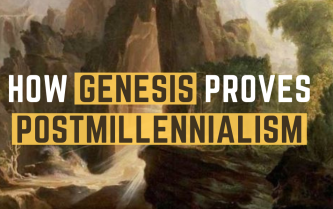 PMW 2023-006 by Gregg Strawbridge
PMW 2023-006 by Gregg Strawbridge
Gentry note: This paper was originally delivered to 1999 Evangelical Theological Society meeting in Boston. Its original, full title was “An Exegetical Defense of Postmillennialism from 1 Corinthians 15: The Eschatology of the Dixit Dominus.”
Overview
This paper is exegetes Paul’s allusion to the first verse of the Dixit Dominus (Psa 110:1: “The LORD says to my Lord: ‘Sit at My right hand, Until I make Thine enemies a footstool for Thy feet.’” / 1Co 15:25: “For He must reign until He has put all His enemies under His feet.”). It shows that Christ is reigning in the exact sense of this verse during the interadvental period. This study gives special attention to the chronology of the events of 1 Corinthians 15:22–26, supported by the emphatic frequency of the NT teaching that Christ ascended to the “right hand” fullfilling the Dixit Dominus. Significant reflection is given to the chronological argument that death, the last enemy, is overcome at the parousia when those alive will be “changed” (1Co 15:23, cf 15:52-54). The study concludes by noting the difficulties such an exegesis raises for preterist (full preterist), dispensational, premillennial, and pessimistic amillennial eschatologies.
The Dixit Dominus in the NT
The importance of the Dixit Dominus (Psa 110) and particularly the first two verses are paramount. The first verse of Psalm 110 is directly quoted or referred to at least 21 times in the New Testament—more than any other Hebrew Scripture verse. Including references to the later verses of the Psalm in Hebrews (Heb 5:6, 7:17, 7:21, 5:10, 6:20, 7:11, 7:15), the Psalm is referred to some 28 times in the New Testament. It is quite an understatement, then, to say that this passage is highly significant for a theology of Messiah and His kingdom.
The Dixit Dominus in Paul’s Resurrection Defense
One of the most significant theological expositions of Psalm 110:1 is found in 1 Corinthians 15:25 and the context.
For as in Adam all die, so also in Christ all shall be made alive. But each in his own order: Christ the first fruits, after that those who are Christ’s at His coming, then comes the end, when He delivers up the kingdom to the God and Father, when He has abolished all rule and all authority and power. For He must reign until He has put all His enemies under His feet. The last enemy that will be abolished is death. (1Co 15:22–26).
Context and Purpose of 1 Corinthians 15:25–26
The entire chapter of 1 Corinthians 15 is directed to the question of the validity of bodily resurrection, as indicated in 15:12, “some among you say that there is no resurrection of the dead.” In fact, the words for “resurrection” are used 22 times in the passage (15:4–52). In developing his answer Paul provides sequential language, moving from Christ’s resurrection to the “end” (telos). Why does Paul’s defense of resurrection include an explanation involving the kingdom and reign of Christ? Because resurrection regards death, and death is a kingdom enemy. So, Paul must discuss the reign of Christ and invoke kingdom concepts.
 The Harrowing of Hell (by Jay Rogers)
The Harrowing of Hell (by Jay Rogers)
This postmillennial book examines the power of the Gospel, not only to overcome all opposition, but to rise far above the powers of hell. The term “Harrowing of Hell” refers to idea that Christ descended into Hell, as stated in the Apostles’ Creed.
For more Christian educational materials: www.KennethGentry.com
The specific context of 15:25–26 is the origin of death (“for as in Adam all die”), the Messianic deliverance from death (“so also in Christ all shall be made alive”), and the sequence of this deliverance: “But each in his own order: Christ the first fruits, after that those who are Christ’s at His coming.” The term “order” is from the root tagma. The tagma (“proper order”) proceeds in the following manner: Christ was resurrected, “after that” (epeita) the resurrection of “those who are Christ’s at His coming” (parousia) (v. 23), “then comes the end.” Paul is giving a chronological sequence of events in using adverbs epeita and eita which are for “marking the sequence of one thing after another.”
The Telos
The phrase epeita to telos (“then comes the end”) is elucidated by Paul. Contextually, the “end” (telos) is “when He delivers up the kingdom to the God and Father, when He has abolished all rule and all authority and power” (15:24). Thus, the telos is “when” the kingdom is consummated. The “end” is not when the kingdom is initiated, but rather when it is finalized. The idea that the telos is an end period is not warranted by Paul’s grammar, contextual discussion, nor his use of the term. Neither does the syntax support the “end period” concept. Continue reading →
 PMW 2024-032 by Kendall Lankford
PMW 2024-032 by Kendall Lankford
 PMW 2023-057 by Kenneth L. Gentry, Jr.
PMW 2023-057 by Kenneth L. Gentry, Jr. PMW 2023-045 by Kenneth L. Gentry, Jr.
PMW 2023-045 by Kenneth L. Gentry, Jr. PMW 2023-025 by Kenneth L. Gentry, Jr.
PMW 2023-025 by Kenneth L. Gentry, Jr.
 PMW 2023-006 by Gregg Strawbridge
PMW 2023-006 by Gregg Strawbridge
 PMW 2022-078 by Kenneth L. Gentry, Jr.
PMW 2022-078 by Kenneth L. Gentry, Jr.
Recent comments